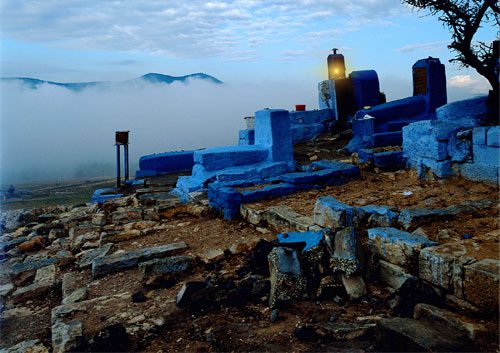Secret of Eretz Yisrael
by Tzvi Fishman
On the fifth day of Av, thousands of Jews in Israel travel to the ancient cemetery in Safed to pay respects to the renowned Kabbalist, the holy Arizal, on the anniversary of his yahrtzeit. Rabbi Chaim Vital, the foremost student of the Ari, writes in his preface to Ari’s book, “Etz HaChaim,” that the prolongation of the exile and its tribulations are because the learning of the secrets of Torah has been neglected.

In a similar light, Rabbi Avraham Yitzhak HaKohen Kook writes that due to an alienation from the secrets of Torah, the supreme importance of a Jew’s connection to Eretz Yisrael is not properly understood. In his classic treatise, “Orot,” Rabbi Kook bases his deep insights into the renaissance of the Jewish nation in Eretz Yisrael on the esoteric teachings of the Arizal and the holy Zohar, dressing up Kabbalistic concepts in the language of developing nationhood and rebirth. He writes:
“By alienating oneself from the secrets of G-d, the highest segulot (treasures) of the deep Divine life become extraneous, secondary matters which do not enter the depths of the soul, and as a result, the most potent force of the individual’s and of the nation’s soul will be missing; and the exile is found to be pleasant in its own accord. For to someone who only understands the superficial level, nothing basic will be lacking in the absence of the Land of Israel, the Jewish Kingdom, and all of the facets of the nation in its built form.”
What is Rabbi Kook saying in this difficult sentence?
He is saying that someone who understands only the superficial level of Judaism will feel nothing lacking if he lives far away from the Land of Israel, in a foreign country, in a gentile land, under a gentile government. A person like this lives a truncated Judaism that focuses on the individual and the individual mitzvot that he or she can do. Without a deeper understanding of the Torah, which is, first and foremost, the national constitution of the Nation of Israel as a whole, teaching us how to live in our unique Holy Land, he will not feel the need for a Jewish Land of his own, nor for a Jewish country with a Jewish army, nor for a life arranged according to the Hebrew calendar, nor for any of the other foundations of national Israeli life. His focus is on Shabbat, kashrut, and tefillin. He thinks that in order to perform them, he does not need Eretz Yisrael. He is satisfied with the individual percepts which he feels he can perform just as well in Chutz L’Aretz, and thus the exile finds favor in his eyes. Being estranged from the national component of Torah, but he does not miss having his own Jewish Homeland. The opposite is true – he enjoys the galut. He enjoys his work, his community, the education he can give to his children, and the opportunity he has to experience the “best of both worlds” – his Judaism and the gentile world around him. If there is an inner need to live in Israel, or to live there because it is the true place of the Torah’s performance, he does not feel it. Therefore, something will be missing in his yearning for Salvation, in his yearning for Jerusalem, and for the Temple, the Sanhedrin, for prophecy, for Jewish Kingship, and for all of the aspects of the Jewish nation in its rebuilt form. To his way of thinking, the concept of nationhood has nothing to do with Judaism, or with being “Frum.” He fails to understand that the highest worship and sanctification of G-d comes through the life of the Nation of Israel, in the Land of Israel, and not through the deeds of the individual Jew in the exile.
One of the great contributions of the Arizal was revealing the relationship between transgression and rectification, known as tikun. For instance, the sin of the Spies in the wilderness fell on the night of Tisha B’Av. Our Sages tell us that their lack of faith in G-d, expressed in their refusing to journey on to Israel, and their rejection of the supreme importance of the Land of Israel to the Jewish People and Torah, planted the seeds for the future national destruction and exile. Because their sin was in despising the cherished Land, the rectification is to love the Land and to make every possible effort to live there.
On the eve of Tisha B’Av, here are some deep Torah teachings to help awaken our love for the Land and increase our yearning to live there.
The Arizal taught that just by eating the fruits of Eretz Yisrael, a person’s fear and reverence for G-d is increased.
In a similar light, the great Torah master, the Chatam Sofer, taught that just saying the words “Eretz Yisrael” increases a person’s kedushah (holiness).
The Hasidic master, Rabbi Nachman of Breslov, who based much of his teachings on the secrets which the Arizal revealed, taught his students that the holiness of Eretz Yisrael is the epitome of holiness, encompassing all other levels of holiness, and that genuine enlightenment and Torah wisdom come only in the Land of Israel. Repeatedly, he stated that only through the special spiritual treasures of Eretz Yisrael can a Jew rise up to the highest levels in the service of G-d. In addition, he taught that true faith and prayer are only possible in Eretz Yisrael, for it is here that prayer ascends to the worlds above (Likutei Etzot, Eretz Yisrael).
He states: “When a person attains to the level of the Land of Israel, he is worthy of being called ‘a man of strength and valor.’ Before he attains this level, ‘Let not him who girdeth on his armor boast as the one who takes it off.’ But when he has gone through the battle successfully, he is worthy of the name ‘a man of war.’”
In addition to deepening our Torah learning, how can we increase our love and yearning for the Land of Israel?
Rabbi Nachman says: “Pray to G-d to give you desire and yearning for the Land of Israel. Then you will succeed in reaching there.”
True, making aliyah is a very difficult mitzvah. In addition to the great joy and spiritual elevation that it brings, it is filled with challenges. Talmud teaches that it is impossible to come to the Land of Israel without difficulties and suffering, and that to attain three things, Torah, the World to Come, and Eretz Yisrael, self-sacrifice is needed. Rabbi Nachman explains that “the root of all the difficulties and suffering lies in the slanderous image of the Land which is put about by the wicked. They are the source of all of the obstacles. But the power of the Torah which we draw into ourselves enables us to overcome all the obstacles, difficulties, and suffering. The more profound a person’s grasp of the Torah, and the greater tikun he brings about through his attainment, the greater his victory will be over the obstacles, and he will succeed in reaching the Land of Israel.”
May we all be so worthy soon.






